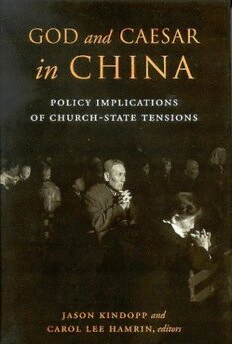
God and Caesar in China: Policy Implications of Church-State Tensions PDF
209 Pages·2004·0.849 MB·English
Most books are stored in the elastic cloud where traffic is expensive. For this reason, we have a limit on daily download.
Preview God and Caesar in China: Policy Implications of Church-State Tensions
Description:
Religion's dramatic revival in post-Mao China has generated tensions between the ruling communist party-state and China's increasingly diverse population of religious adherents. Such tensions are rooted in centuries-old governing practices and reflect the pressures of rapid modernization. The party-state's policy response has been a mixture of accommodation and repression, with the aim of preserving monopoly control over religious organization. Its inability to do so effectively has led to cycles of persecution of religious groups that resist the party's efforts at control. American concern over official acts of religious persecution has become a leading issue in US policy towards China. The passage of the 1998 International Religious Freedom Act, which institutionalized concern over religious freedom abroad in US foreign policy, cemented this issue as an item on the agenda of US-China relations. This book examines religion policy in China, the history and growth of the Catholic and Protestant churches in China, and the implications of church-state friction for US-China relations. It concludes with recommendations for US policy.
See more
The list of books you might like
Most books are stored in the elastic cloud where traffic is expensive. For this reason, we have a limit on daily download.
